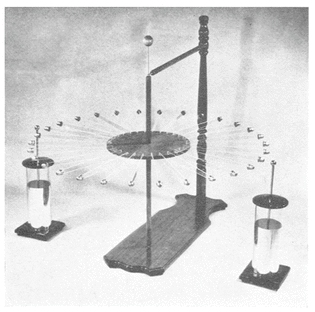Reference




Moonshot's Answer
Andrew Gordon's electric motor was directly related to the versorium as it was constructed based on the principles of the versorium, an early scientific instrument used to detect electric charge. The versorium, designed by William Gilbert, typically consists of a lightweight needle that would rotate when in the presence of an electric charge. Gordon's electric motor, built a century and a half later, seems to have been the first of its kind, and it utilized the concept of electrostatic forces to create motion, similar to how the versorium responded to electric charges. This connection highlights the evolution of electric motor technology from early detection devices to practical applications of electricity. Images related to the versorium and early electric motors can be found in various sources, such as Wikipedia and other academic encyclopedias, illustrating the historical development of these devices.